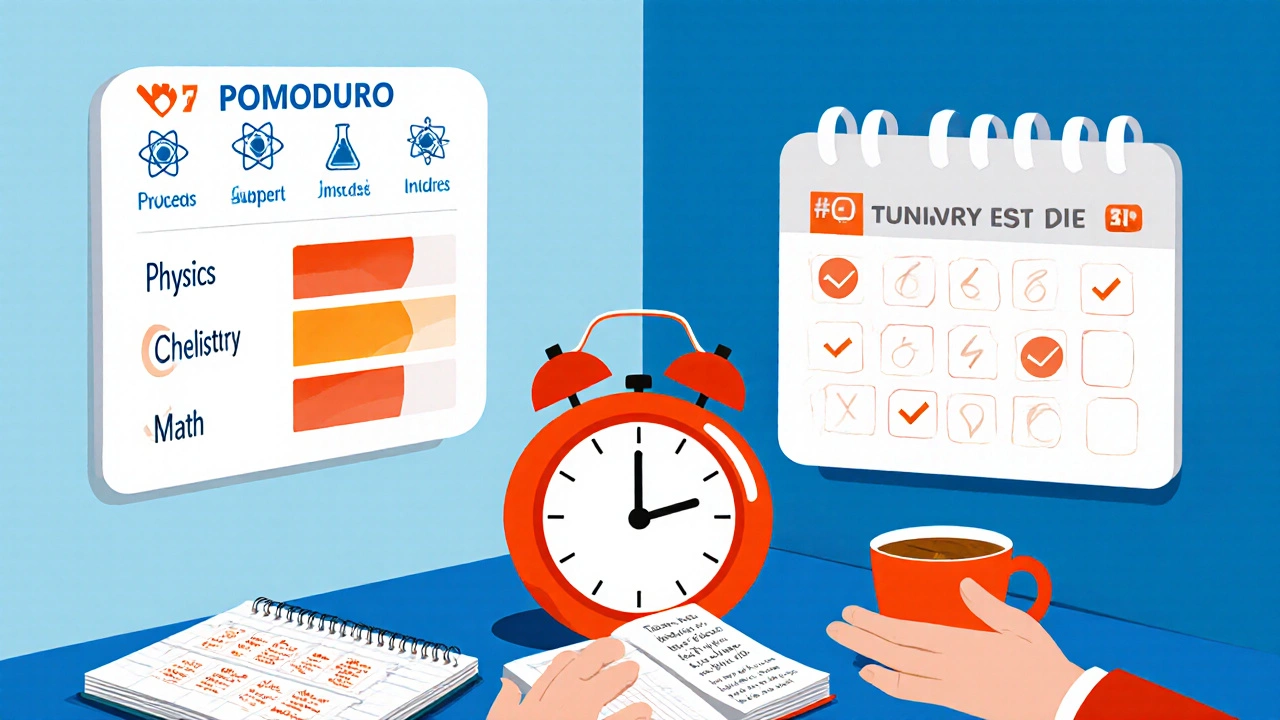How to Crack IIT JEE in 6 Months: Real Stories & Proven Plan
 Oct, 21 2025
Oct, 21 2025
IIT JEE 6-Month Preparation Tracker
Progress: 0%
Physics
Recommended: 30% of daily study
Chemistry
Recommended: 35% of daily study
Mathematics
Recommended: 35% of daily study
When people ask IIT JEE 6 months, they’re really wondering if a short, intense sprint can replace years of steady study. The answer isn’t a simple yes or no; it depends on strategy, resources, and personal discipline. Below is a complete, battle‑tested roadmap that shows how top scorers squeezed a top rank into half a year.
What the IIT JEE Really Demands
IIT JEE is the gateway exam for India's premier engineering institutes. It consists of two stages-JEE Main and JEE Advanced-that test physics, chemistry, and mathematics at college‑level depth. Scoring above the All‑India Rank (AIR) 10,000 typically requires mastering concepts, solving high‑difficulty problems, and timing yourself under pressure.
Is a 6‑Month Crash Course Realistic?
Data from the past five years shows that about 3‑4% of successful candidates started their focused prep within six months of the JEE Main test. Most of them had a strong foundation from class 10‑12 board studies and followed a disciplined plan. If you’re starting from scratch, expect extra time for basics.
Core Ingredients of a 6‑Month Plan
- NCERT textbooks are the single most reliable source for concepts. Every JEE problem can be traced back to an NCERT chapter.
- Coaching institute material (if you choose one) adds shortcuts, previous‑year questions, and structured test series.
- Mock tests serve as the feedback loop. Aim for at least one full‑length mock every ten days.
- Active recall and spaced repetition turn passive reading into long‑term memory.
- Time management blocks daily study into 3‑4 focused sessions with short breaks.

Resource Checklist
| Aspect | Self‑Study | Coaching |
|---|---|---|
| Cost | ₹15,000‑20,000 (books + online subscriptions) | ₹80,000‑1,20,000 (full‑time batch) |
| Flexibility | High - set your own schedule | Fixed batch timings, less flexibility |
| Mentor Support | Limited - forums, doubt‑clearing calls | Daily doubt‑clearing, weekly tests |
| Material Quality | Depends on self‑selection (NCERT, Arihant, etc.) | Curated notes, video lectures, question banks |
| Motivation | Self‑driven; risk of burnout | Peer pressure and scheduled milestones |
Month‑by‑Month Roadmap
- Month 1 - Foundation Sprint: Finish all NCERT physics, chemistry, and math chapters. Use active recall flashcards for key formulas.
- Month 2 - Concept Deep‑Dive: Start tackling JEE‑specific theory from a single reference (e.g., H.C. Verma for physics). Solve 30‑40 problems per chapter.
- Month 3 - Problem‑Solving Engine: Begin a dedicated problem book (e.g., Chakrabarty or Arihant). Focus on learning multiple solution paths.
- Month 4 - Mock Test Cycle: Take a full‑length mock every ten days. Analyze errors, categorize weak topics, and revise.
- Month 5 - Speed & Accuracy: Reduce solve time per question by 10‑15%. Practice previous‑year JEE papers under timed conditions.
- Month 6 - Final Polish: Revise all formula sheets, take two full‑length mocks per week, and simulate the actual exam day (same start time, no breaks).
Time‑Management Hacks That Keep You Fresh
Working 10‑12 hours a day sounds heroic, but burnout is real. Follow the POMODORO technique: 25 minutes of focused study, 5‑minute break, repeat four times, then a longer 20‑minute rest. Schedule a 30‑minute outdoor walk after each afternoon session to reset your brain.

Success Stories in a Nutshell
- Rohan, a 2022 JEE Advanced AIR 98, started his crash plan after a 4‑month gap from school. He used only NCERT + an online mock series and hit his target in 5 months.
- Priya, who missed the 2023 batch deadline, joined a weekend coaching program. With a strict 6‑hour daily routine, she cracked JEE Main within 180 days and cleared JEE Advanced in the next cycle.
Common Pitfalls & How to Dodge Them
- Skipping fundamentals: If a concept feels fuzzy, pause and revisit NCERT. Short‑term shortcuts never replace deep understanding.
- Over‑reliance on one resource: Diversify problem sets. Different authors ask the same idea in varied ways.
- Ignoring health: Sleep less than 6 hours leads to slower recall. Keep a steady sleep schedule.
- Neglecting analysis: After each mock, spend at least twice the test time reviewing every wrong answer.
Quick Checklist Before You Begin
- Gather the three NCERT textbooks (Physics, Chemistry, Mathematics).
- Choose a single JEE reference for each subject (e.g., H.C. Verma, O.P. Tandon, S. Loney).
- Subscribe to a reputable online mock platform (e.g., Embibe, Unacademy Test Series).
- Set up a daily timetable with at least 6 hours of dedicated study.
- Plan weekly “recovery” activities - sport, music, or short trips.
Can I really start from zero and crack IIT JEE in six months?
Starting from zero is extremely challenging. You need a solid high‑school math and science base. If you’re comfortable with class 12 concepts, a six‑month sprint becomes doable with the right plan.
Do I need a coaching institute for a six‑month crash?
Not mandatory. Self‑study works if you discipline yourself, use quality material, and take regular mocks. Coaching adds structure and doubt‑clearing, which many students find helpful.
How many hours should I study each day?
Aim for 6‑8 hours split into 3‑4 sessions. Include short breaks and a 30‑minute physical activity to keep energy high.
What’s the best way to track my progress?
Use a spreadsheet: list topics, mark completed chapters, record mock scores, and note error categories. Review the sheet weekly.
How important are previous‑year papers?
Crucial. They reveal recurring patterns, exam weightage, and the exact difficulty level. Aim to solve at least three years’ worth before the actual test.